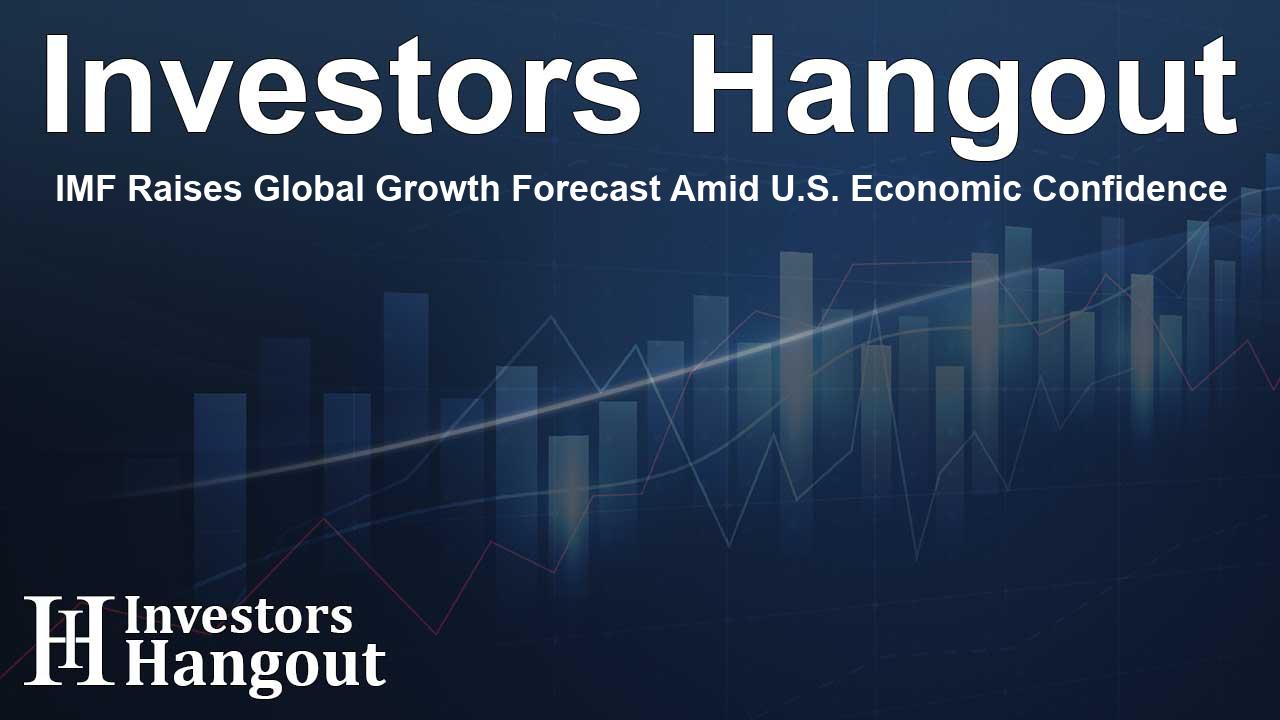IMF Raises Global Growth Forecast Amid U.S. Economic Confidence

IMF Adjusts Economic Outlook Amid Global Changes
The recent statement from the International Monetary Fund (IMF) highlighted an increase in the global growth forecast for 2025 by one-tenth of a percentage point. This positive adjustment comes largely due to better-than-expected growth in the United States, effectively balancing out downward revisions reported in several other major economies, including Germany and France.
Global Growth Projections and Inflation Trends
The latest World Economic Outlook observed by the IMF estimates global growth at 3.3% for both 2025 and 2026. Alongside this, the IMF anticipates a decline in global headline inflation to 4.2% in 2025 and 3.5% in 2026. This downward trend in inflation could facilitate a normalization of monetary policy, helping to stabilize global economies that have faced disruptions in recent years.
The Importance of Global Cooperation
Despite these optimistic projections, the IMF cautions against individual countries adopting protectionist measures such as tariffs, non-tariff barriers, and subsidies, all of which could adversely impact international trade relationships. Such unilateral actions can create a cycle of retaliation, ultimately harming all involved nations. According to IMF chief economist Pierre-Olivier Gourinchas, these policies rarely lead to sustained benefits for domestic markets.
Anticipating U.S. Economic Policies
This updated forecast from the IMF arrives at a pivotal moment, just before the inauguration of a newly elected U.S. administration, which has indicated potential economic policy changes. There are concerns surrounding proposed tariffs on imports and other restrictions, especially in light of the impactful implications these can have on trade agreements worldwide.
Potential Consequences for Global Trade
The IMF has warned that an escalation of protectionist policies, such as imposing new tariffs, could heighten existing trade tensions and diminish overall market efficiency. These actions could not only dampen investment opportunities but also disrupt established supply chains, affecting economies both in the short and medium term.
Monitoring Digital Currency Developments
In the context of evolving financial landscapes, the IMF expressed a commitment to closely monitor how the upcoming U.S. administration might approach the regulation of digital currencies. Gourinchas emphasized the significance of effective oversight for cross-border payment systems to avoid potentially destabilizing financial shocks.
Challenges of Tariffs and Immigration Policies
The introduction of tariffs can complicate businesses' access to critical materials, leading to increased operational costs. Additionally, proposed immigration restrictions could exacerbate labor shortages, further impacting business expenses. These factors may collectively hinder economic growth in the long run.
Disparities in Economic Growth Forecasts
The IMF predicts robust growth for the United States at 2.7%, an increase from previous forecasts. This surge is attributed to a strong job market and rising investments, though growth is expected to stabilize at 2.1% thereafter. Conversely, the outlook for the Euro area has been downgraded, with growth projected at only 1.0% for 2025, influenced by weaker than anticipated manufacturing progress and ongoing political uncertainties.
Regional Economic Insights
Germany's economic expansion is now estimated at a mere 0.3%, significantly lower than earlier projections, while France's expected growth has also been trimmed. Meanwhile, China's growth forecast saw a slight increase following a fiscal stimulus announcement earlier in the year. The IMF has adjusted estimates for various regions due to fluctuations in oil production and consequent economic activity implications.
Future Recommendations and Considerations
As the IMF evaluates ongoing conditions, it anticipates an ongoing decline in inflation rates, aided by slow labor market changes and falling energy prices. Nevertheless, there exists the potential for a resurgence in inflationary pressures, primarily driven by trade policy shifts, which could compel monetary authorities to adopt a more responsive approach to maintain economic stability.
Looking Ahead
The IMF highlights the necessity for global economies to remain vigilant against the risks that international trade policies can impose. It emphasizes that effective and informed economic strategies are essential for safeguarding growth, with proactive and agile monetary policymaking being keys to navigating the uncertain economic landscape ahead.
Frequently Asked Questions
What did the IMF recently adjust in its growth forecast?
The IMF raised its global growth forecast for 2025 by one-tenth of a percentage point, largely due to stronger growth in the U.S.
How is the U.S. economic outlook affecting global forecasts?
The optimistic U.S. growth outlook contributes positively to global projections, offsetting slower growth expectations in other major economies.
Why does the IMF oppose protectionist measures?
The IMF cautions that protectionist policies can harm international trade relationships and lead to retaliatory measures that leave all nations worse off.
What are the projected inflation rates according to the IMF?
The IMF expects global headline inflation to drop to 4.2% in 2025 and 3.5% in 2026, signaling a potential return to normal monetary policy.
How is the IMF addressing digital currency regulations?
The IMF is closely monitoring regulatory movements in the U.S. regarding digital currencies to ensure robust oversight of financial systems.
About The Author
Contact Dominic Sanders privately here. Or send an email with ATTN: Dominic Sanders as the subject to contact@investorshangout.com.
About Investors Hangout
Investors Hangout is a leading online stock forum for financial discussion and learning, offering a wide range of free tools and resources. It draws in traders of all levels, who exchange market knowledge, investigate trading tactics, and keep an eye on industry developments in real time. Featuring financial articles, stock message boards, quotes, charts, company profiles, and live news updates. Through cooperative learning and a wealth of informational resources, it helps users from novices creating their first portfolios to experts honing their techniques. Join Investors Hangout today: https://investorshangout.com/
The content of this article is based on factual, publicly available information and does not represent legal, financial, or investment advice. Investors Hangout does not offer financial advice, and the author is not a licensed financial advisor. Consult a qualified advisor before making any financial or investment decisions based on this article. This article should not be considered advice to purchase, sell, or hold any securities or other investments. If any of the material provided here is inaccurate, please contact us for corrections.
